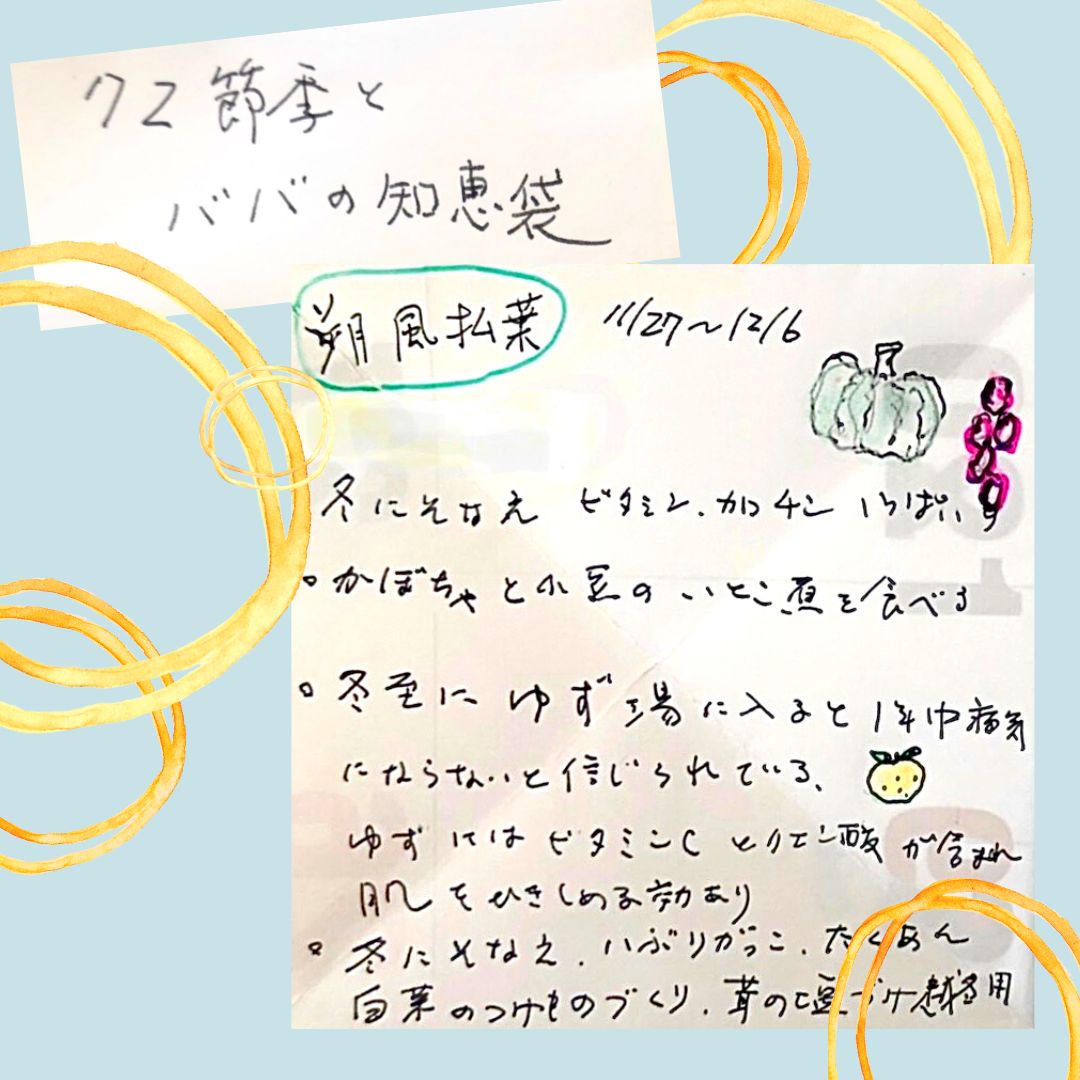November 27 - December 1 North wind blows the leaves from the trees
To play Shoko Hikage's original music for this micro-season
[Laptop users] Click the orange circle with a white arrow
[Mobile users] Click "Listen in browser" or if you have a SoundCloud account, click "Play on SoundCloud"
[Laptop users] Click the orange circle with a white arrow
[Mobile users] Click "Listen in browser" or if you have a SoundCloud account, click "Play on SoundCloud"
|
Pocket Grandma Wisdom - Akitababa Edition
Preparing for the Harsh Winter Weather In preparation for the harsh winter weather, we fortify ourselves by taking in plenty of vitamins and carotene, eating “Itokoni” stew made of Kabocha squash and Adzuki beans. Because we can’t harvest fresh vegetables during winter, we pickle and/or smoke them while we can, making Takuan and Iburigakko from Daikon radishes. Hakusai cabbage and mushrooms make great overnight pickles with salt, too. You can put Yuzu citrus in the bath to stay healthy throughout the year. Yuzu is rich in vitamin C and citric acid, and the Yuzu infused bath would tighten your skin and refresh your mind with its aroma. Shoko Hikage’s octogenarian mother Yoshie Hikage (aka Akitababa) had a dedicated career in the field of education for young children. After retiring, she has been engaged in making haiku and tanka poetry featuring wild flowers. She became active in disaster recovery efforts after the Great East Japan Earthquake by housing mothers and children who lost their home due to the quake, tsunami and the radiation from the nuclear plants. After 2013, she started to read her poetry works in public in the U.S. (Santa Cruz and San Francisco) and South Korea as well as in Japan. |
Shoko Hikage began playing koto at the age of three. Her first teacher was Chizuga Kimura of the Ikuta-ryu Sokyoku Seigen Kai in Akita Prefecture, Japan. From 1985, she received special training from the 2nd and 3rd IEMOTO Seiga Adachi. In 1988, Hikage graduated from Takasaki College with a major in koto music. She was then accepted as a special research student in Sawai Koto Institute under Tadao and Kazue Sawai, where she received her master's certificate. Hikage also completed a one-year intensive seminar at the Sawai Sokyoku In. In 1992, she moved to Honolulu, Hawaii to teach koto at the Sawai Koto Kai Hawaii and at the University of Hawaii. There she held her first American solo recital at the Honolulu Academy of Arts Theatre as part of the New Music Across America Series. In 1997, she moved to San Francisco where she continued her concert and teaching activities. Hikage premiered Hyo-shin Na's “Crazy Horse" for Korean Traditional Orchestra and Koto Solo with the National Orchestra of Traditional Instruments in Seoul, Korea in November, 2011. In the Bay Area, she also premiered Hyo-shin Na’s " Night Procession of the Hundred Demons", "Koto Music" and "Koto Ninano". In 2014, Hikage gave a solo recital with a program devoted to Hyo-shin Na's music for koto/bass koto at Buam Arts Hall in Seoul, Korea. In 2017, Hikage organized historic concerts “Hengenjizai World of Koto Music” featuring two koto virtuosos, Soju Nosaka and Kazue Sawai at Herbst Theater in San Francisco. In 2022, Hikage moved back to Japan and is currently based in Fukushima, Japan.

